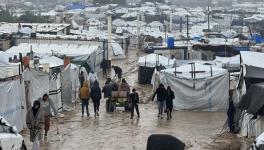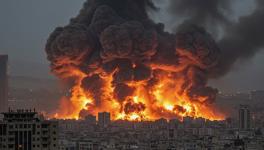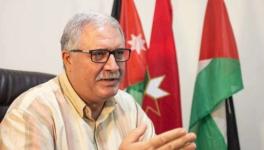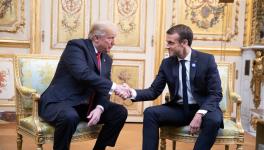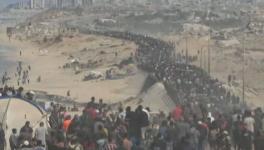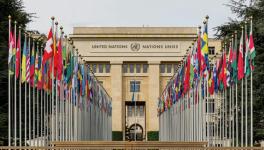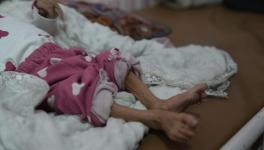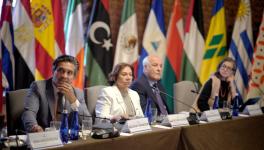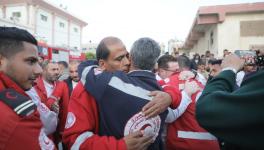In Palestine, Healthcare is Also a Form of Resistance
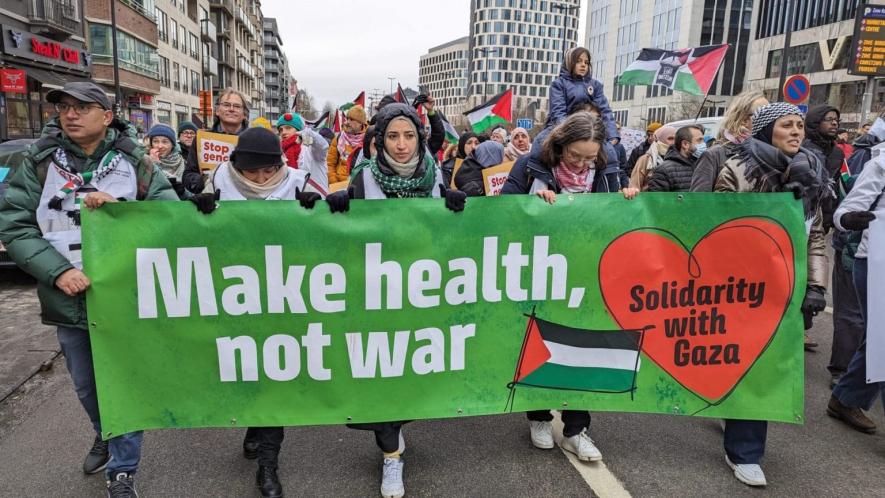
Doctors for the People at a solidarity rally, 2024. (source: MPLP/GVHV)
In the second part of the interview with Hanne Bosselaers, a general practitioner of Médecine Pour le People [Doctors for the People, MPLP], who worked at the Al-Awda Hospital in Gaza, Sophia Assis from the Zetkin Forum for Social Research finds out more about the role of health workers in building and maintaining a spirit of steadfastness and community in Gaza and other occupied territories.
You can read the first part of the interview here.
Sophia Assis: What is the importance of healthcare and health workers to the resistance of the Palestinian people?
Hanne Bosselaers: Healthcare workers are important as they are trained, highly educated, so they have important knowledge, but they are also dedicated to serve their people. This combination is very strong, and makes their health services resilient, even if they are underfunded and lack everything. Even in the gap between the bombings, they are not able to provide health care as it should be, but they are so creative and so dedicated that they can manage these extreme circumstances. I really admire the people from Al-Awda Hospital; how they continue to go there despite having their director captive for over 60 days now. They don’t have any news about him and 12 other members of their personnel. In all of Gaza, hundreds of health workers are still being held in prison with no news. They might be executed or still alive, we really don’t know. And their colleagues just continue. This dedication to providing health in any circumstance is quite unique and very strong.
The people support health workers a lot. You can often see the population coming to the hospital and bringing food, even under such difficult circumstances. Health care is seen as something from the community. Especially the primary healthcare centers, like in Beit Hanoun, were like community centers. People walked in and out, would come and chat, bring tea, bring cookies. The Palestinians appreciate their healthcare workers, doctors, nurses, pharmacists… But they also help. If the center needs to be rebuilt or repainted, you will have a lot of people from the community coming and helping. So it is really built by the people.
SA: What do you think of Israel’s attacks on hospitals and health structures in Gaza? Has it been possible to maintain contact with health workers in the hospitals that are still active?
HB: When we talk about the strength of the health system, we are talking about these highly educated and dedicated professionals who are also a sort of resistance. If you need to exterminate a population because you want to take its lands, healthcare workers are the first ones to be attacked. We see that not only in the case of health care, but also in the case of cultural and intellectual figures, journalists, professors, and scientists, who have been murdered. They represent part of people’s needs; if you have a tactic of extermination, they are the first targets.
That’s what we have seen during all Israel’s attacks on Gaza. It’s not new. Since 2012, they have always targeted health care, and not by hazard or by collateral damage, but directly singling out ambulances, hospitals, and healthcare workers while they are doing their work. Even during the Great Return in 2020, when people marched to the wall around Gaza, healthcare workers were directly targeted by snipers. It is definitely a tactic that is coming back. It’s a strategy. It’s a genocidal strategy to consciously take away the things that people need the most. And they are also conscious of it.
There is a very strong collective identity. No one leaves Gaza to be individually saved. If Palestinians leave, they remain with something attached to the Palestinian land. There are very few people who leave permanently and don’t carry their identity and their will for freedom for Palestine within them. It’s very hard for all Palestinians from Gaza who are abroad or who evacuated during this war.
Coming back to your question, yes, the contact has been fragmented, but we have information about what is happening, especially in Al-Awda, because we have close contacts. There is a lot of good journalism on social media as well. People keep on making videos and going into the hospitals, showing the world what is happening. We won’t be able to tell afterwards that we didn’t know what was happening. Everything is very well-documented.
I hope that the International Court of Justice will rule on the documentation about the repeated attacks on health care. There are hundreds and hundreds of cases. They will have to go through all of it and hold Israel accountable because we cannot let it go with all this impunity. This is also something that the global solidarity movement of health workers is seeing: the attacks are so repeated, so strategic, so cruel, that more and more health workers say that we have to stand up against them.
SA: In your opinion, what do you think health professionals should do to demonstrate solidarity with Palestine?
HB: Go to demonstrations and identify as a health care worker. You can speak out with the other healthcare workers against all the attacks we see on Palestinian healthcare. Of course, support the case of South Africa at the International Court of Justice. I think it’s really important to help document attacks on healthcare and support healthcare workers because even here, we have a voice and are listened to… So we must try to speak up. These are specific examples. Of course, we are part of the broad solidarity movement with Palestine, which is a civil movement with a lot of different currents. Identifying as a healthcare worker within this movement and speaking up against the attacks on health is an important aspect of international solidarity. And that’s why we see in different countries new organizations of healthcare workers for Palestine appearing. And I think this emerging movement should reinforce the global movement, where we defend health everywhere at all times, accessible to all.
SA: Speaking of solidarity, in Belgium and Europe, we have seen so many solidarity actions with Palestine. Could you tell us about the actions that have been developed in the MPLP medical centers?
HB: We are organizing together with Viva Salud, our sister organization, which has a lot of international partners. We made a big emergency appeal for Al-Awda Hospital, which already collected more than EUR 200,000. It is one of the largest emergency funds that we ever raised. And we see that people are really generous and trust us because I went there and know this organization. So when we go to the market here in Molenbeek, it is easy to convince people to donate because it goes straight to an organization we know and that does good work.
This solidarity appeal is very important because it is not only helping to rebuild a part of the Gazan health system but a way to sensibilize, make people see what is happening on the ground, and give them the possibility to act.
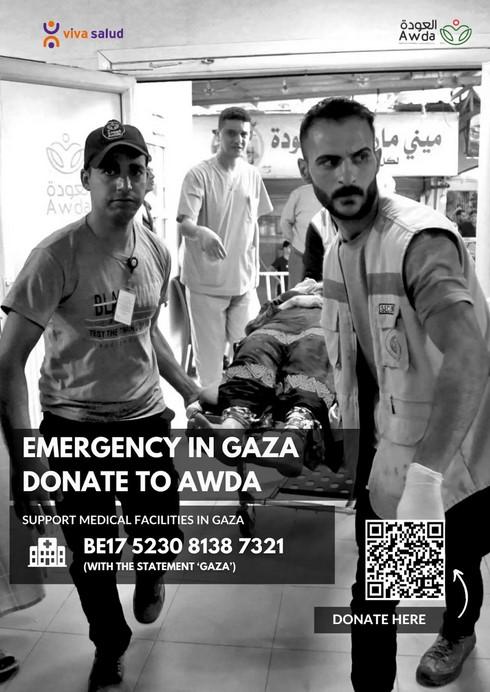
Leaflet for the emergency campaign to support AWDA. Source: Viva Salud
We have other solidarity initiatives going on, and of course we take part in all the demonstrations in solidarity with Palestine. On the last demonstration in January, we went with a banner saying “Make health, not war” with a lot of health workers from MPLP, but also other health professionals. We try to build this movement further.
We also have “Boycott Teva”, a campaign focusing on an Israeli company that produces generic drugs, which is very, very complicit with the Israeli government. There are many alternatives to the non-essential drugs that Teva produces in the Belgian market, so it is easy for healthcare workers not to prescribe Teva. We also sensibilize our pharmacists. This is a campaign that we have been doing since 2014. We keep it going and do some sensibilization about not prescribing Teva medicines.
SA: What is the importance of internationalism for MPLP?
HB: It is important to stand up against injustice everywhere in the world because if an occupation and apartheid, a genocide, as cruel as we see it in Palestine, exists, it is through the powers that rule the whole world. It’s the capitalist economic system that produces these kinds of cruelty. And when it happens, it’s essential to stand with the people, to choose your side. And that is something we do in Belgium as MPLP. But we want to do it globally, and we want to seek other organizations internationally to support each other. That’s why we send people to Palestine. That’s why we talk a lot about it, and not only Palestine – we also have solidarity projects in Congo, in the Philippines, in Cuba. This internationalism is essential if we want to liberate the world from our current system that is causing oppression and inequality. We will have to be strong, and we will have to have international solidarity and international ties. It’s part of our DNA and for me, it was a decisive factor in my engagement.
If I hadn’t been to Gaza, I don’t know if I would be such an engaged doctor in MPLP today. They really inspired me. We have so much to learn from the Palestinian way of organizing, from the way they have their identity rooted really profoundly in them. All the children, for example, know the great Palestinian poets, they know how to dance the traditional dance Dabke, and how to make the Palestinian food. There is a very large cultural identity that they preserve. And the collective resistance is one of the most inspiring things I have seen in my life. It gives me a lot of fuel for activism.
People’s Health Dispatch is a fortnightly bulletin published by the People’s Health Movement and Peoples Dispatch. For more articles and to subscribe to People’s Health Dispatch, click here.
Get the latest reports & analysis with people's perspective on Protests, movements & deep analytical videos, discussions of the current affairs in your Telegram app. Subscribe to NewsClick's Telegram channel & get Real-Time updates on stories, as they get published on our website.









